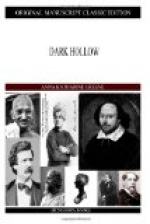Oliver Ostrander.
Witnesses to above signature,
Archibald Ostrander, Bela Jefferson.
Shelby........November 7, 1898.
XXV
“What do you think of him now?”
This was the document and these the words which Deborah, widow of the man thus doubly denounced, had been given to read by the father of the writer, in the darkened room which had been and still was to her, an abode of brooding thought and unfathomable mystery.
No wonder that during its reading more than one exclamation of terror and dismay escaped her, as the once rehabilitated form of the dead and gone started into dreadful life again before her eyes. There were so many reasons for believing this record to be an absolute relation of the truth.
Incoherent phrases which had fallen from those long-closed lips took on new meaning with this unveiling of an unknown past. Repugnances for which she could not account in those old days, she now saw explained. He would never, even in passing, give a look at the ruin on the bluff, so attractive to every eye but his own. As for entering its gates—she had never dared so much as to ask him to do so. He had never expressed his antipathy for the place, but he had made her feel it. She doubted now if he would have climbed to it from the ravine even to save his child from falling over its verge. Indeed, she saw the reason now why he could not explain the reason for the apathy he showed in his hunt for Reuther on that fatal day, and his so marked avoidance of the height where she was found.
Then the watch! Deborah knew well that watch. She had often asked him by what stroke of luck he had got so fine a timepiece. But he had never told her. Later, it had been stolen from him; and as he had a mania for watches, that was why, perhaps—
God! was her mind veering back to her old idea as to his responsibility for the crime committed in Dark Hollow? Yes; she could not help it. Denial from a monster like this—a man who with such memories and such spoil, could return home to wife and child, with some gay and confused story of a great stroke in speculation which had brought him in the price of the tavern it had long been his ambition to own—what was denial from such lips worth, though emphasised by the most sacred of oaths, and uttered under the shadow of death. The judge was right. Oliver—whose ingenuous story had restored his image to her mind, with some of its old graces—had been the victim of circumstances and not John Scoville. Henceforth, she would see him as such, and when she had recovered a little from the effect of this sudden insight into the revolting past, she would—
Her thoughts had reached this stage and her hand, in obedience to the new mood, was lightly ruffling up the pages before her, when she felt a light touch on her shoulder and turned with a start.




